动词不定式专题:不带to不定式的十八种情况
省略to的动词不定式情况举例

省略to的动词不定式情况举例以下是小编为大家列举的省略to 的动词不定式情况,希望能帮助大家更好地认识不定式,提高英语水平。
1) 情态动词 ( 除ought 外,ought to):2) 使役动词 let, have, make:3) 感官动词 see, watch, look at, notice , observe, hear, listen to, smell, feel, find 等后作宾补,省略to。
注意:在被动语态中则to 不能省掉。
I saw him dance.=He was seen to dance.The boss made them work the whole night.=They were made to work the whole night.4) would rather,had better:5) Why… / why not…:6) help 可带to,也可不带to, help sb (to) do sth:7) but和except:but前是动词do时,后面出现的动词用不带to的动词不定式。
8) 由and, or和than连接的两个不定式,第二个to 可以省去:9) 通常在discover, imagine, suppose, think, understand等词后,可以省去to be:He is supposed (to be) nice. 他应该是个好人。
举例:He wants to do nothing but go out.He wants to move to France and marry the girl.比较: He wants to do nothing but go out.He wants to believe anything but to take the medicine.典型例题1) ---- I usually go there by train.---- Why not ___ by boat for a change?A. to try goingB. trying to goC. to try and goD. try going答案:D. why not 后面接不带to 的不定式,因此选D。
不定式什么时候不带to
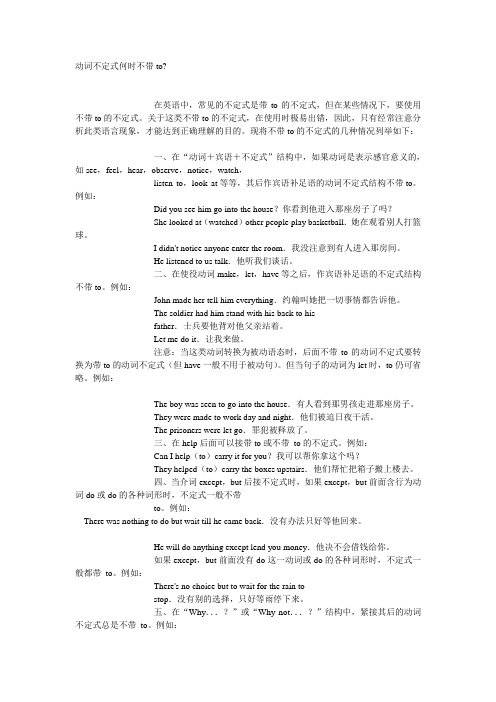
动词不定式何时不带to?在英语中,常见的不定式是带to的不定式,但在某些情况下,要使用不带to的不定式。
关于这类不带to的不定式,在使用时极易出错,因此,只有经常注意分析此类语言现象,才能达到正确理解的目的。
现将不带to的不定式的几种情况列举如下:一、在“动词+宾语+不定式”结构中,如果动词是表示感官意义的,如see,feel,hear,observe,notice,watch,listen to,look at等等,其后作宾语补足语的动词不定式结构不带to。
例如:Did you see him go into the house?你看到他进入那座房子了吗?She looked at(watched)other people play basketball.她在观看别人打篮球。
I didn't notice anyone enter the room.我没注意到有人进入那房间。
He listened to us talk.他听我们谈话。
二、在使役动词make,let,have等之后,作宾语补足语的不定式结构不带to。
例如:John made her tell him everything.约翰叫她把一切事情都告诉他。
The soldier had him stand with his back to hisfather.士兵要他背对他父亲站着。
Let me do it.让我来做。
注意:当这类动词转换为被动语态时,后面不带to的动词不定式要转换为带to的动词不定式(但have一般不用于被动句)。
但当句子的动词为let时,to仍可省略。
例如:The boy was seen to go into the house.有人看到那男孩走进那座房子。
They were made to work day and night.他们被迫日夜干活。
The prisoners were let go.罪犯被释放了。
省略to的动词不定式情况举例
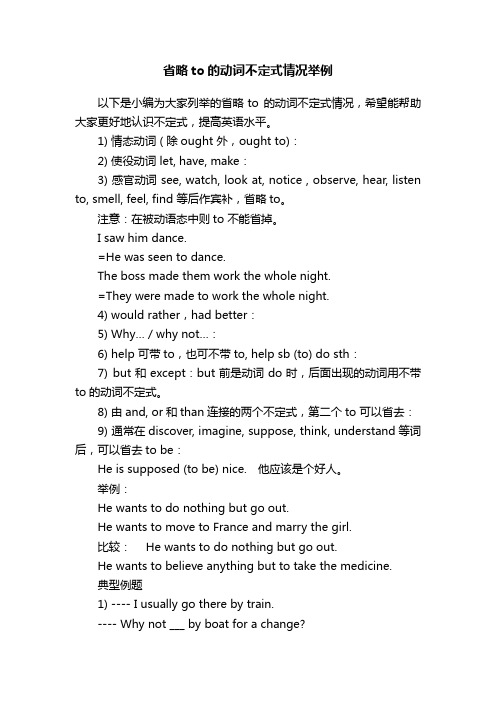
省略to的动词不定式情况举例以下是小编为大家列举的省略to 的动词不定式情况,希望能帮助大家更好地认识不定式,提高英语水平。
1) 情态动词 ( 除ought 外,ought to):2) 使役动词 let, have, make:3) 感官动词 see, watch, look at, notice , observe, hear, listen to, smell, feel, find 等后作宾补,省略to。
注意:在被动语态中则to 不能省掉。
I saw him dance.=He was seen to dance.The boss made them work the whole night.=They were made to work the whole night.4) would rather,had better:5) Why… / why not…:6) help 可带to,也可不带to, help sb (to) do sth:7) but和except:but前是动词do时,后面出现的动词用不带to的动词不定式。
8) 由and, or和than连接的两个不定式,第二个to 可以省去:9) 通常在discover, imagine, suppose, think, understand等词后,可以省去to be:He is supposed (to be) nice. 他应该是个好人。
举例:He wants to do nothing but go out.He wants to move to France and marry the girl.比较: He wants to do nothing but go out.He wants to believe anything but to take the medicine.典型例题1) ---- I usually go there by train.---- Why not ___ by boat for a change?A. to try goingB. trying to goC. to try and goD. try going答案:D. why not 后面接不带to 的不定式,因此选D。
不带to的不定式
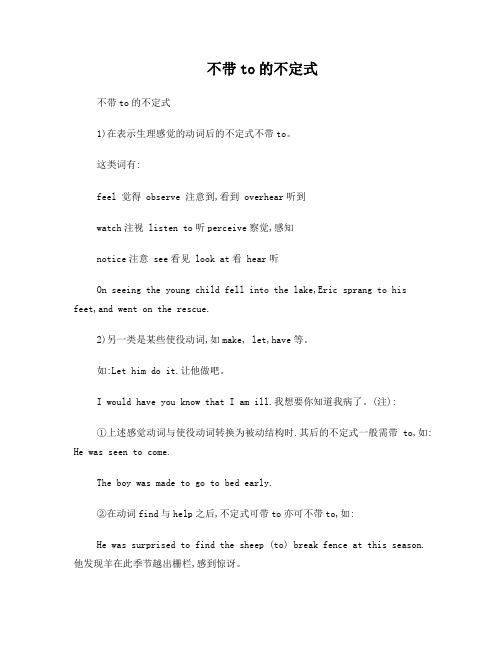
不带to的不定式不带to的不定式1)在表示生理感觉的动词后的不定式不带to。
这类词有:feel 觉得 observe 注意到,看到 overhear听到watch注视 listen to听perceive察觉,感知notice注意 see看见 look at看 hear听On seeing the young child fell into the lake,Eric sprang to his feet,and went on the rescue.2)另一类是某些使役动词,如make, let,have等。
如:Let him do it.让他做吧。
I would have you know that I am ill.我想要你知道我病了。
(注):①上述感觉动词与使役动词转换为被动结构时.其后的不定式一般需带to,如: He was seen to come.The boy was made to go to bed early.②在动词find与help之后,不定式可带to亦可不带to,如:He was surprised to find the sheep (to) break fence at this season.他发现羊在此季节越出栅栏,感到惊讶。
3)在do nothing/anything/everything but(except)结构中。
例如:Last night I did nothing but watch TV.昨天晚上,我除了看电视别的什么也没有干。
但是,如果谓语动词不是“do nothing,anything,everything”,那么but(except)所跟的不定式则仍须带。
The doctor told him nothing but to stop smoking.医生除了让他戒烟,其它什么都没有说。
There was nothing for them to do but to remain silent.除了保持沉默以外,他们没有别有别的办法。
不定式省略to的九种情况

不定式省略to的九种情形一.使役动词后省略to的情形在let, make, have等使役动词后用作宾语补足语的不定式必须省略to等使役动词后用作宾语补足语的不定式必须省略to.如:My mother wouldn’t let me go to the film. 我妈妈不会让我去看片子的.I don’t like milk, but mother made me drink it. 我不爱好牛奶,可是母亲强制我喝.I would have him wait for me at the gate of the park. 我要他在公园门口等我.留意:1. 当使役动词用于自动语态时,要补上在自动语态中省略的to(主如果指make,let和have很罕用于自动语态).2. force, oblige等固然也暗示“使”,但它们后用作宾语补足语的不定式必须带to.如:He forced me to go with them. 他迫使我同他们一路去.The police obliged him to leave. 警方强制他分开.二.感到动词后省略to的情形在感到动词后用作宾语补足语的不定式必须省略to在感到E: 10.5pt; mso-ascii-font-family: 'Times New Roman';mso-bidi-font-family: 'Times New Roman'">.如:I watched her get into the car. 我看着她上了车.I saw the woman enter a bank. 我看见这个女人进了一家银行.We often hear her sing this song. 我们经常听到她唱这首歌.Did you notice her leave the house? 她分开房子你留意到了吗?留意:1. 这里所说的感到动词重要包含see, hear, observe, notice, feel, watch等.但是它们用于自动语态时,厥后的不定式必须带to.如:Th 'Times New Roman'">有人看见这个女人进了一家银行.但是,用于以上句型的动词notice 和watch平日不必于自动语态.2. 相似地,动词look at和listen to后用作宾语补足语的不定式也不带to.如:We listened to the old man tell his story. 我们听这位白叟讲述他的阅历.3. 若动词feel后用作宾语补足语的不定式为 to be,则要带 to be to(其他情形不带 to).如:They felt the plan to be unwise. 他们以为这个筹划不明智.4. 若不定式为完成式,平日应带 to.如:.如:I noticed her to have come early. 我留意到她来得很早.三.动词help后省略to的情形在动词help后用作宾语或宾语补足语的不定式可以不带to.如:Can I help (to) carry this heavy box? 我可以辅佐扛这个重箱子吗?Mother helped me (to) do my homework. 妈妈帮忙我做功课.留意:1. 当 help 之后接一个较长的名词词组作宾语或当个中的不定式所暗示的动作主语不直接介入时,不定式平日带to.如:Help the little boys at the back of the hall to carry the chairs out. 请帮大厅后面那些小男孩把椅子搬出去.请帮大厅后面那些小男孩把椅子搬出去.These tablets will help you to sleep. 这些药片将对你的睡眠有帮忙.2. 在当help用于自动语态时,不定式前的to不克不及省略.如:The boy was helped by awoman to collect his scattered coins. 那男孩由一个妇女帮他捡拾狼藉一地的货币.四.why (not)…后省略to的情形在why (not)…?之后的不定式不克不及带to.如:Why go with him? 为什么要同他一路去?Why not ask the teacher? 为什么不去问问先生?Why not try to expand your story into a novel? 你怎么不把你的故事扩大成小说呢?五.动词know后省略to的情形在“know+宾语+不定式”中,不定式有时省略 to,有时不省,可分以下两种情形评论辩论:1. 若 know 为如今式,该构造中的不定式只限于 to be,且个中的to不克不及省略.如:I know him to be ill. 我知道他病了.We knew her to be honest. 我们知道她是说谎的.2. 若know为完成式或曩昔式,则该构造中的不定式可以用除 to be外的其他动词,且此时个中的to可以省留.如:I never knew him (to) do such a thing. 我从未据说他会干那种事.We’ve never known him (to) tell a lie. 我们从未据说他撒过谎.I’ve never known it (to) snow in July before. 我从未据说过有七月下雪的事.但在自动语态中不定式前的to不克不及省略.如许用的know 不但仅暗示一般意义的“知道”,而是暗示一种阅历,是以常译为“曾“……过”(用于确定句时)或“(从来)没有……过”(用于否认句时)..六.介词except / but后省略to的情形用作介词except, but宾语的不定式有时带tw Roman'">except, but,有时不带to.其大致原则是:若其前消失了动词 do,厥后的不定式平日不带 to;若其前没有消失动词 do,则厥后的不定式平日带 to.如:I had no choice but to wait. 除了等,我没有此外选择.He wanted nothing but to stay there. 他只想留在那儿.It had no effect except to make him angry. 除惹他朝气外,没产生任何后果.She can do everything except cook. 除了做饭之外她什么都邑.七.主语带do表语省略to的情形当主语部分有动词do的某种情势时,用作表语的不定式可以省略to.如:All you do now is (to) complete the form. 你如今要做的只是把这张表填好.The only thing to do now is (to) go on. 进步是如今独一的出路.What I’ll do is (to) tell her the truth. 我要做的就是告知她本相.八.并列不定式省略to的情形当两个或多个感化雷同的不定式并列时,平日只需在第一个不定式前用to,其余不定式前的to可以省略.如:He told me to staythere and wait for him. 他叫我在那儿等他.I’m really puzzled what to think or say. 我真不知该怎么想怎么说.我真不知该怎么想怎么说.It is easier to persuade people than (to) force them. 说服人轻易,强制人难.但是,假如两者有比较关系,则后面不定式前的to不成省略.如:To try and fail is better than not to try at all. 测验测验而掉败总比不测验测验好.九.省略不定式是否保存to在必定的高低文中,为了防止反复,有时不定式可以省略,但平日保存不定式符号to.如:I shall go if I want to. 假如我想去就去.“Don’t be late.” “I’ll try not to.” “不要来晚了.”“我尽量不来晚.”Don’t go till I tell you to. 等我叫你走你再走.留意:1.若被省略的不定式为to be短语,则平日应保存to be.如:He is not the man he used to be. 他已不是本来的谁人样子了.2. 有时省略不定式时,同时也可省略to.如:">toShe may go if she likes (to). 她想去就可以去.动词不定式省略to的情形:(1)不定式在感不雅动词(see, notice, look at, listen to, hear, watch, feel, observe).使役动词(let, make, have)后作宾语补足语时,平日省去to.如:I have my students come early.(2)不定式在help后作宾补时,可带to,也可省略to.如:I helped him(to)find his lost watch.留意:以上两种情形变成自动语态时要加上to.如:She was seen to go into the classroom.(3)假如两个或多个不定式并列应用时,常在第一个不定式前面加to,后面一般都省略.如:To try and fail is better than not to try at all.6. “疑问词+不定式”构成的不定式短语在句中可以作主语.宾语和表语.如:She told me when to start.四.接如今分词作宾补的20个经常应用动词bring sb. doing sth.引起或人做某事 catch sb. doingsth. 碰上(撞上)或人做某事discover sb. doingsth. 发明或人做某事 feel sb. doingsth. 感到或人做某事find sb. doingsth. 碰上(撞上)或人做某事 get sb. doingsth. 使或人做某事have sb. doingsth. 使或人做某事hear sb.doingsth. 听见或人做某事keep sb. doingsth. 使或人不断地做某事 listen to sb. doingsth. 听或人做某事look at sb. doingsth. 看着或人做某事 notice sb. doingsth. 留意到或人做某事observe sb. doingsth. 不雅察或人做某事 prevent sb. doingsth. 阻拦或人做某事see sb. doingsth. 看见或人做某事 send sb. doing sth.使或人(忽然)做某事set sb. doingsth. 使(引起)或人做某事 start sb. doingsth. 使或人开端做某事stop sb. doingsth. 阻拦或人做某事watch sb. doingsth. 不雅五.接动词本相作宾补的11个经常应用动词feel sb. dosth. 感到或人做某事 have sb. dosth. 使或人做某事hear sb. dosth. 听见或人做某事 let sb. do sth.让或人做某事listen to sb. dosth. 听着或人做某事 look at sb. dosth. 看着或人做某事make sb. dosth. 使或人做某事 notice sb. dosth. 留意或人做某事observe sb. dosth. 不雅察或人做某事 see sb. dosth. 看见或人做某事watch sb. dosth. 不雅察或人做某事。
英语中不定式省略to的10种情况
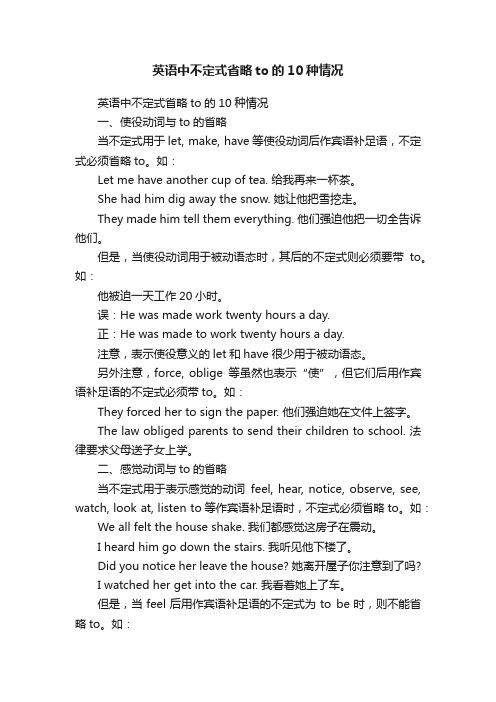
英语中不定式省略to的10种情况英语中不定式省略to的10种情况一、使役动词与to的省略当不定式用于let, make, have等使役动词后作宾语补足语,不定式必须省略to。
如:Let me have another cup of tea. 给我再来一杯茶。
She had him dig away the snow. 她让他把雪挖走。
They made him tell them everything. 他们强迫他把一切全告诉他们。
但是,当使役动词用于被动语态时,其后的不定式则必须要带to。
如:他被迫一天工作20小时。
误:He was made work twenty hours a day.正:He was made to work twenty hours a day.注意,表示使役意义的let和have很少用于被动语态。
另外注意,force, oblige等虽然也表示“使”,但它们后用作宾语补足语的不定式必须带to。
如:They forced her to sign the paper. 他们强迫她在文件上签字。
The law obliged parents to send their children to school. 法律要求父母送子女上学。
二、感觉动词与to的省略当不定式用于表示感觉的动词feel, hear, notice, observe, see, watch, look at, listen to等作宾语补足语时,不定式必须省略to。
如:We all felt the house shake. 我们都感觉这房子在震动。
I heard him go down the stairs. 我听见他下楼了。
Did you notice her leave the house? 她离开屋子你注意到了吗?I watched her get into the car. 我看着她上了车。
需要省略to的不定式的情况有
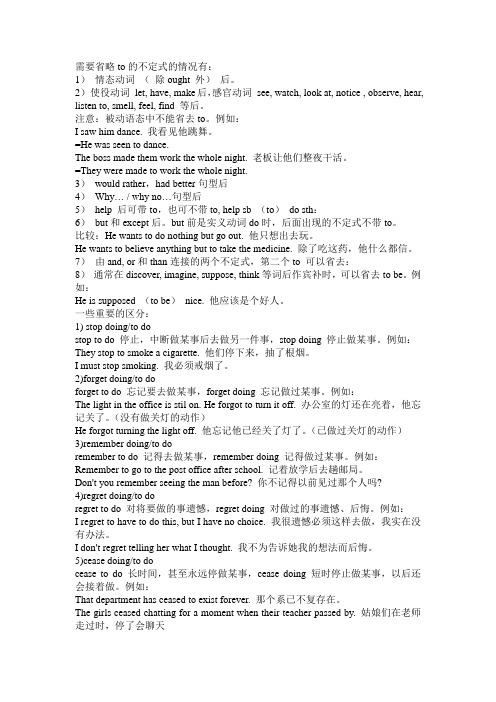
需要省略to的不定式的情况有:1)情态动词(除ought 外)后。
2)使役动词let, have, make后,感官动词see, watch, look at, notice , observe, hear, listen to, smell, feel, find 等后。
注意:被动语态中不能省去to。
例如:I saw him dance. 我看见他跳舞。
=He was seen to dance.The boss made them work the whole night. 老板让他们整夜干活。
=They were made to work the whole night.3)would rather,had better句型后4)Why… / why no…句型后5)help 后可带to,也可不带to, help sb (to)do sth:6)but和except后。
but前是实义动词do时,后面出现的不定式不带to。
比较:He wants to do nothing but go out. 他只想出去玩。
He wants to believe anything but to take the medicine. 除了吃这药,他什么都信。
7)由and, or和than连接的两个不定式,第二个to 可以省去:8)通常在discover, imagine, suppose, think等词后作宾补时,可以省去to be。
例如:He is supposed (to be)nice. 他应该是个好人。
一些重要的区分:1) stop doing/to dostop to do 停止,中断做某事后去做另一件事,stop doing 停止做某事。
例如:They stop to smoke a cigarette. 他们停下来,抽了根烟。
I must stop smoking. 我必须戒烟了。
2)forget doing/to doforget to do 忘记要去做某事,forget doing 忘记做过某事。
动词不定式省略to的9种情况
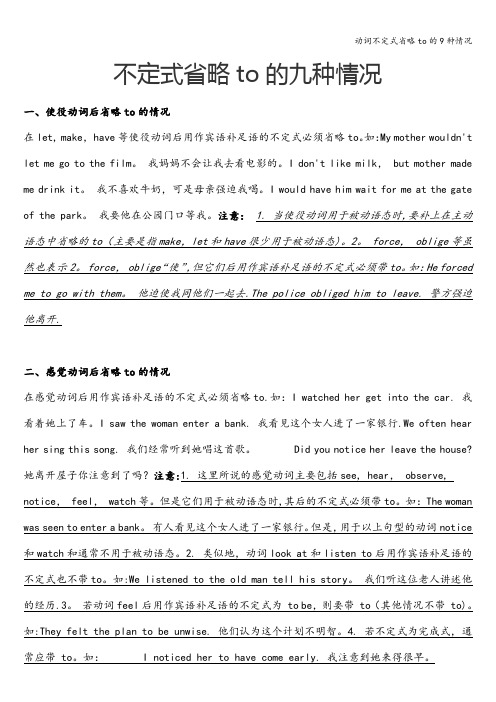
不定式省略to的九种情况一、使役动词后省略to的情况在let, make, have等使役动词后用作宾语补足语的不定式必须省略to。
如:My mother wouldn't let me go to the film。
我妈妈不会让我去看电影的。
I don't like milk, but mother made me drink it。
我不喜欢牛奶,可是母亲强迫我喝。
I would have him wait for me at the gate of the park。
我要他在公园门口等我。
注意:1. 当使役动词用于被动语态时,要补上在主动语态中省略的to(主要是指make,let和have很少用于被动语态)。
2。
force, oblige等虽然也表示2。
force, oblige“使”,但它们后用作宾语补足语的不定式必须带to。
如:He forced me to go with them。
他迫使我同他们一起去.The police obliged him to leave. 警方强迫他离开.二、感觉动词后省略to的情况在感觉动词后用作宾语补足语的不定式必须省略to.如:I watched her get into the car. 我看着她上了车。
I saw the woman enter a bank. 我看见这个女人进了一家银行.We often hear her sing this song. 我们经常听到她唱这首歌。
Did you notice her leave the house? 她离开屋子你注意到了吗?注意:1. 这里所说的感觉动词主要包括see, hear, observe, notice, feel, watch等。
但是它们用于被动语态时,其后的不定式必须带to。
如:The woman was seen to enter a bank。
有人看见这个女人进了一家银行。
不定式省略to的九种情况

不定式省略to的九种情况一、使役动词后省略to的情况在let, make, have等使役动词后用作宾语补足语的不定式必须省略to等使役动词后用作宾语补足语的不定式必须省略to。
如:My mother wouldn’t let me go to the film. 我妈妈不会让我去看电影的。
I don’t like milk, but mother made me drink it. 我不喜欢牛奶,可是母亲强迫我喝。
I would have him wait for me at the gate of the park. 我要他在公园门口等我。
注意:1. 当使役动词用于被动语态时,要补上在主动语态中省略的to(主要是指make,let和have 很少用于被动语态)。
2. force, oblige等虽然也表示“使”,但它们后用作宾语补足语的不定式必须带to。
如:He forced me to go with them. 他迫使我同他们一起去。
The police obliged him to leave. 警方强迫他离开。
二、感觉动词后省略to的情况在感觉动词后用作宾语补足语的不定式必须省略to在感觉E: 10.5pt;mso-ascii-font-family: 'Times New Roman'; mso-bidi-font-family: 'Times New Roman'">。
如:I watched her get into the car. 我看着她上了车。
I saw the woman enter a bank. 我看见这个女人进了一家银行。
We often hear her sing this song. 我们经常听到她唱这首歌。
Did you notice her leave the house? 她离开屋子你注意到了吗?注意:1. 这里所说的感觉动词主要包括see, hear, observe, notice, feel, watch等。
动词不定式省略to的9种情况

不定式省略to的九种情况一、使役动词后省略to的情况在let,make,have等使役动词后用作宾语补足语的不定式必须省略to。
如:Mymotherwouldn’tletmegotothefilm.我妈妈不会让我去看电影的。
Idon’tlikemilk,butmothermademedrinkit.我不喜欢牛奶,可是母亲强迫我喝。
Iwouldhavehimwaitformeatthegateofthepark.我要他在公园门口等我。
注意:1.当使役动词用于被动语态时,要补上在主动语态中省略的to(主要是指make,let和have很少用于被动语态)。
2.force,oblige等虽然也表示2.force,oblige“使”,但它们后用作宾语补足语的不定式必须带to。
如:Heforcedmetogowiththem.他迫使我同他们一起去。
Thepolice obligedhimtoleave.警方强迫他离开。
二、感觉动词后省略to的情况在感觉动词后用作宾语补足语的不定式必须省略to。
如:Iwatchedhergetinto thecar.我看着她上了车。
Isawthewomanenterabank.我看见这个女人进了一家银行。
Weoftenhearhersingthissong.我们经常听到她唱这首歌。
Didyounoticeherleavethehouse?她离开屋子你注意到了吗?注意:1.这里所说的感觉动词主要包括see,hear,observe,notice,feel,watch等。
但是它们用于被动语态时,其后的不定式必须带to。
如:Thewomanwasseen toenterabank.有人看见这个女人进了一家银行。
但是,用于以上句型的动词notice和watch和通常不用于被动语态。
2.类似地,动词lookat和listento 后用作宾语补足语的不定式也不带to。
如:Welistenedtotheoldmantellhissto r y .我们听这位老人讲述3.若动词feel 后用作宾语补足语的不定 式为t o b e ,t o (其他情to)。
动词不定式专题:不带to不定式的十八种情况

不带to不定式的十八种情况动词不定式通常带有符号to,叫做带to的动词不定式(infinitive with "to"),动词不定式有时不带符号to,叫做不带to的动词不定式(infinitive without "to")不带to的动词不定式通常有下面十八种情况:一、与助动词do连用构成谓语动词的否定、疑问和强调形式。
(1)He does not work in the factory.他不在这家工厂上班。
(2)Does she work here?她在这儿上班吗?(3)I did not see her yesterday.我昨天没有看见她。
(4)Did they take you home?他们把你送回家了吗?(5)He does look tired.他看上去的确累了。
(6)They did come yesterday.他们昨天确实来了。
二、与情态动词连用构成复合谓语(1)I can speak English.我会说英语。
(2)May I come in?我能进来吗?(3)Dare he swim across the river? 他敢游过这条河吗?(4)We must work, and above all we must believe in ourselves.我们必须工作,首先我们要信得过自己。
(5)Could you do something for me? 你能为我做点事吗?(6)You shall go at once.你得马上走。
(7)He might be working in the office now. 他这会儿可能正在上班。
(8)I don't think you need have come yesterday. 我觉得你昨天没必要来。
(9)They should be here by now. 他们这会儿应该到了。
英语中不定式省略to的10种情况
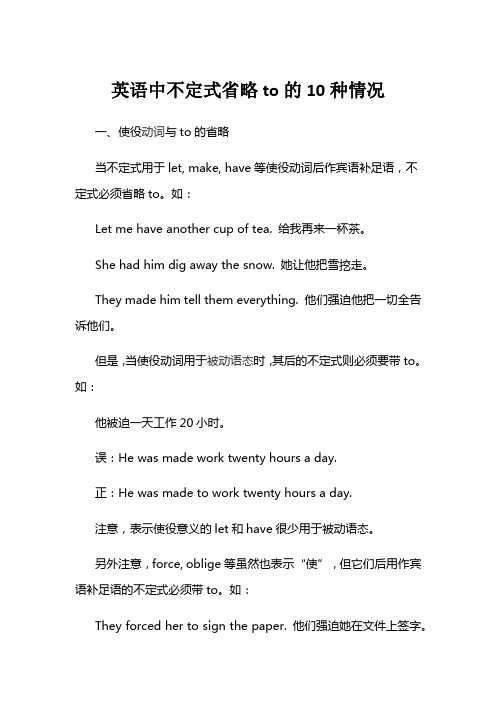
英语中不定式省略to的10种情况一、使役动词与to的省略当不定式用于let, make, have等使役动词后作宾语补足语,不定式必须省略to。
如:Let me have another cup of tea. 给我再来一杯茶。
She had him dig away the snow. 她让他把雪挖走。
They made him tell them everything. 他们强迫他把一切全告诉他们。
但是,当使役动词用于被动语态时,其后的不定式则必须要带to。
如:他被迫一天工作20小时。
误:He was made work twenty hours a day.正:He was made to work twenty hours a day.注意,表示使役意义的let和have很少用于被动语态。
另外注意,force, oblige等虽然也表示“使”,但它们后用作宾语补足语的不定式必须带to。
如:They forced her to sign the paper. 他们强迫她在文件上签字。
The law obliged parents to send their children to school. 法律要求父母送子女上学。
二、感觉动词与to的省略当不定式用于表示感觉的动词feel, hear, notice, observe, see, watch, look at, listen to等作宾语补足语时,不定式必须省略to。
如:We all felt the house shake. 我们都感觉这房子在震动。
I heard him go down the stairs. 我听见他下楼了。
Did you notice her leave the house? 她离开屋子你注意到了吗?I watched her get into the car. 我看着她上了车。
但是,当feel后用作宾语补足语的不定式为to be时,则不能省略to。
不定式省略to的10种情况

不定式省略to的几种情况一、使役动词与to的省略当不定式用于let, make, have等使役动词后作宾语补足语,不定式必须省略to。
如:Let me have another cup of tea.给我再来一杯茶。
She had him dig away the snow.她让他把雪挖走。
They made him tell them everything.他们强迫他把一切全告诉他们。
但是,当使役动词用于被动语态时,其后的不定式则必须要带to。
如:他被迫一天工作20小时。
误:He was made work twenty hours a day.正:He was made to work twenty hours a day.注意,表示使役意义的let和have很少用于被动语态。
另外注意,force, oblige等虽然也表示“使”,但它们后用作宾语补足语的不定式必须带to。
如:They forced her to sign the paper.他们强迫她在文件上签字。
The law obliged parents to send their children to school.法律要求父母送子女上学。
二、感觉动词与to的省略当不定式用于表示感觉的动词feel, hear, notice, observe, see, watch, look at, listen to等作宾语补足语时,不定式必须省略to。
如:We all felt the house shake.我们都感觉这房子在震动。
I heard him go down the stairs.我听见他下楼了。
Did you notice her leave the house?她离开屋子你注意到了吗?I watched her get into the car.我看着她上了车。
但是,当feel后用作宾语补足语的不定式为to be时,则不能省略to。
高考英语省略to的动词不定式八种情况

高考英语省略to的动词不定式八种情况一、感觉动词后省略to的情况主语+ (四看see/watch/notice/look at,三使役let/make/have,两听listen to/hear, 一感觉feel)+宾语+do sth,省略to。
1. 在感觉动词后用作宾语补足语的不定式必须省略to。
1)这里所说的感觉动词主要包括see, hear, observe, notice, feel, watch等。
但是它们用于被动语态时,其后的不定式必须带to。
如:The woman was seen to enter a bank. 有人看见这个女人进了一家银行。
但是,用于以上句型的动词notice 和watch和通常不用于被动语态。
2)类似地,动词look at和listen to后用作宾语补足语的不定式也不带to。
如:We listened to the old man tell his story. 我们听这位老人讲述他的经历。
3)若动词feel后用作宾语补足语的不定式为to be,则要带to(其他情况不带to)。
如:They felt the plan to be unwise. 他们认为这个计划不明智。
4)若不定式为完成式,通常应带to。
如:I noticed her to have come early. 我注意到她来得很早。
2. 使役动词后省略to的情况在let, make, have等使役动词后用作宾语补足语的不定式必须省略to。
如:My mother wouldn’t let me go to the film. 我妈妈不会让我去看电影的。
1) 当使役动词用于被动语态时,要补上在主动语态中省略的to(主要是指make,let和have很少用于被动语态)。
2) force, oblige等虽然也表示“使”,但它们后用作宾语补足语的不定式必须带to。
如:He forced me to go with them. 他迫使我同他们一起去。
动词不定式省略to的9种情况

动词不定式省略to的9种情况不定式省略to的九种情况一、使役动词后省略to的情况在let, make, have等使役动词后用作宾语补足语的不定式必须省略to。
如:My mother wouldn’t let me go to the film. 我妈妈不会让我去看电影的。
I don’t like milk, but mother made me drink it. 我不喜欢牛奶,可是母亲强迫我喝。
I would have him wait for me at the gate of the park. 我要他在公园门口等我。
注意:1. 当使役动词用于被动语态时,要补上在主动语态中省略的to(主要是指make,let和have很少用于被动语态)。
2. force, oblige等虽然也表示2. force, oblige“使”,但它们后用作宾语补足语的不定式必须带to。
如:He forced me to go with them. 他迫使我同他们一起去。
The police obliged him to leave. 警方强迫他离开。
二、感觉动词后省略to的情况在感觉动词后用作宾语补足语的不定式必须省略to。
如:I watched her get into the car. 我看着她上了车。
I saw the woman enter a bank. 我看见这个女人进了一家银行。
We often hear her sing this song. 我们经常听到她唱这首歌。
Did you notice her leave the house? 她离开屋子你注意到了吗?注意:1. 这里所说的感觉动词主要包括see, hear, observe, notice, feel, watch等。
但是它们用于被动语态时,其后的不定式必须带to。
如:The woman was seen to enter a bank. 有人看见这个女人进了一家银行。
动词不定式省略to的9种情况

不定式省略to的九种情况一、使役动词后省略to的情况在let, make, have等使役动词后用作宾语补足语的不定式必须省略to。
如:My mother wouldn’t let me go to the film. 我妈妈不会让我去看电影的。
I don’t like milk, but mother made me drink it. 我不喜欢牛奶,可是母亲强迫我喝。
I would have him wait for me at the gate of the park. 我要他在公园门口等我。
注意:1. 当使役动词用于被动语态时,要补上在主动语态中省略的to(主要是指make,let和have很少用于被动语态)。
2. force, oblige等虽然也表示2. force, oblige“使〞,但它们后用作宾语补足语的不定式必须带to。
如:He forced me to go with them. 他迫使我同他们一起去。
The police obliged him to leave. 警方强迫他离开。
二、感觉动词后省略to的情况在感觉动词后用作宾语补足语的不定式必须省略to。
如:I watched her get into the car. 我看着她上了车。
I saw the woman enter a bank. 我看见这个女人进了一家银行。
We often hear her sing this song. 我们经常听到她唱这首歌。
Did you notice her leave the house? 她离开屋子你注意到了吗?注意:1. 这里所说的感觉动词主要包括see, hear, observe, notice, feel, watch等。
但是它们用于被动语态时,其后的不定式必须带to。
如:The woman was seen to enter a bank. 有人看见这个女人进了一家银行。
省略to的动词不定式八种情况

省略to的动词不定式⼋种情况⼀、感觉动词后省略to的情况主语+ (四看see/watch/notice/look at,三使役let/make/have,两听listen to/hear, ⼀感觉feel)+宾语+do sth,省略to。
1. 在感觉动词后⽤作宾语补⾜语的不定式必须省略to。
1)这⾥所说的感觉动词主要包括see, hear, observe, notice, feel, watch等。
但是它们⽤于被动语态时,其后的不定式必须带to。
如:The woman was seen to enter a bank. 有⼈看见这个⼥⼈进了⼀家银⾏。
但是,⽤于以上句型的动词notice 和watch和通常不⽤于被动语态。
2) 类似地,动词look at和listen to后⽤作宾语补⾜语的不定式也不带to。
如:We listened to the old man tell his story. 我们听这位⽼⼈讲述他的经历。
3) 若动词feel后⽤作宾语补⾜语的不定式为 to be,则要带to(其他情况不带 to)。
如:They felt the plan to be unwise. 他们认为这个计划不明智。
4) 若不定式为完成式,通常应带 to。
如:Inoticed her to have come early. 我注意到她来得很早。
2.使役动词后省略to的情况在let, make, have等使役动词后⽤作宾语补⾜语的不定式必须省略to。
如:My mother wouldn’t let me go to the film. 我妈妈不会让我去看电影的。
1)当使役动词⽤于被动语态时,要补上在主动语态中省略的to(主要是指make,let和have很少⽤于被动语态)。
2) force, oblige等虽然也表⽰ “使”,但它们后⽤作宾语补⾜语的不定式必须带to。
如:He forced me to go with them.他迫使我同他们⼀起去。
英语常考不带to的动词不定式汇总

常考的英语不带to的动词不定式:一:情态动词(Modal Verbs)情态动词后面一般接不带to的动词不定式。
如:Can:能够,会I can play the piano. 我会弹钢琴。
Could:可以,能够She could speak French fluently. 她可以流利地说法语。
May:可能,可以You may come in now. 你现在可以进来了。
Might:或许,可能会It might rain later. 或许等会儿会下雨。
Will:将要,会They will arrive at noon. 他们将于中午到达。
Would:愿意,会He would love to go with you. 他很想和你一起去。
Should:应该You should listen to your parents. 你应该听你父母的话。
Must:必须We must finish this project by tomorrow. 我们必须在明天之前完成这个项目。
二:特殊动词(Special Verbs)这些动词表示某种特殊含义,后面也一般接不带to的动词不定式。
如:Let:让,允许Let me help you. 让我来帮你。
Make:使...She made him angry. 她让他生气了。
Help:帮助Can you help me carry this? 你能帮我拿这个吗?Watch:看,观看We are watching TV. 我们正在看电视。
三:感官动词(Sensation Verbs)这些动词表示感官体验,也一般接不带to的动词不定式。
如:Feel:感觉She feels tired after work. 她工作后感到疲倦。
See:看,看见I see a bird on the tree. 我看到树上有只鸟。
Hear:听,听见Can you hear the music? 你听到音乐了吗?四:动词短语(Verb Phrases)这些动词由一个动词和一个名词或形容词构成,也一般接不带to的动词不定式。
英语中不定式省略to的九种情况
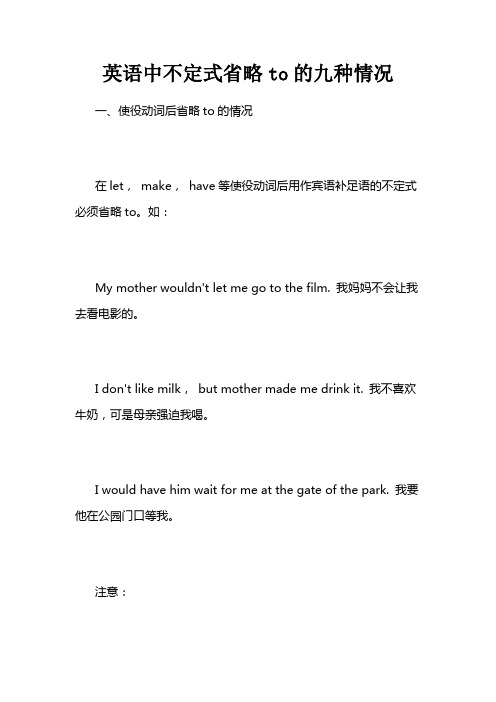
英语中不定式省略to的九种情况一、使役动词后省略to的情况在let,make,have等使役动词后用作宾语补足语的不定式必须省略to。
如:My mother wouldn't let me go to the film. 我妈妈不会让我去看电影的。
I don't like milk,but mother made me drink it. 我不喜欢牛奶,可是母亲强迫我喝。
I would have him wait for me at the gate of the park. 我要他在公园门口等我。
注意:1. 当使役动词用于被动语态时,要补上在主动语态中省略的to(主要是指make,let和have很少用于被动语态)。
2. force,oblige等虽然也表示“使”,但它们后用作宾语补足语的不定式必须带to。
如:He forced me to go with them. 他迫使我同他们一起去。
The police obliged him to leave. 警方强迫他离开。
二、感觉动词后省略to的情况在感觉动词后用作宾语补足语的不定式必须省略to。
如:I watched her get into the car. 我看着她上了车。
I saw the woman enter a bank. 我看见这个女人进了一家银行。
We often hear her sing this song. 我们经常听到她唱这首歌。
Did you notice her leave the house?她离开屋子你注意到了吗?注意:1. 这里所说的感觉动词主要包括see,hear,observe,notice,feel,watch等。
但是它们用于被动语态时,其后的不定式必须带to。
如:The woman was seen to enter a bank. 有人看见这个女人进了一家银行。
但是,用于以上句型的动词notice 和watch通常不用于被动语态。
- 1、下载文档前请自行甄别文档内容的完整性,平台不提供额外的编辑、内容补充、找答案等附加服务。
- 2、"仅部分预览"的文档,不可在线预览部分如存在完整性等问题,可反馈申请退款(可完整预览的文档不适用该条件!)。
- 3、如文档侵犯您的权益,请联系客服反馈,我们会尽快为您处理(人工客服工作时间:9:00-18:30)。
不带to不定式的十八种情况动词不定式通常带有符号to,叫做带to的动词不定式(infinitive with "to"),动词不定式有时不带符号to,叫做不带to的动词不定式(infinitive without "to")不带to的动词不定式通常有下面十八种情况:一、与助动词do连用构成谓语动词的否定、疑问和强调形式。
(1)He does not work in the factory.他不在这家工厂上班。
(2)Does she work here?她在这儿上班吗?(3)I did not see her yesterday.我昨天没有看见她。
(4)Did they take you home?他们把你送回家了吗?(5)He does look tired.他看上去的确累了。
(6)They did come yesterday.他们昨天确实来了。
二、与情态动词连用构成复合谓语(1)I can speak English.我会说英语。
(2)May I come in?我能进来吗?(3)Dare he swim across the river? 他敢游过这条河吗?(4)We must work, and above all we must believe in ourselves.我们必须工作,首先我们要信得过自己。
(5)Could you do something for me? 你能为我做点事吗?(6)You shall go at once.你得马上走。
(7)He might be working in the office now. 他这会儿可能正在上班。
(8)I don't think you need have come yesterday. 我觉得你昨天没必要来。
(9)They should be here by now. 他们这会儿应该到了。
(10)If you will go into the fields and turn over a few big stones, you are sure to uncover a city of ant "people".如果你愿意去田间掀开几块大石头,你肯定能发现一个“义民城”。
但与情态动词ought(to)连用时通常带to,和used(to)连用时必须带to三、在表示感觉的动词如:see, look at, watch, hear, listen to, feel, notice, observe, perceive(觉察,看见),behold(书面用语“见到”)等后用作宾语补足语的动词不定。
(1)I saw her cross the street.我看见她过了大街。
(2)He looked at the children walk up the hill. 他看着孩子们上了山。
(3)I watched the boy cross the road.我看到那男孩过了马路。
(4)I heard her play the piano.我听见她弹钢琴了。
(5)He listened to us talk.他听我们说话。
(6)I felt the floor move.我感到地板动了。
(7)I didn’t notice you enter.我没注意到你进来。
(8)He observed someone open the door.他注意到有人把门打开。
(9)I did not perceive anyone come in.我没察觉有人进来。
(10)He beheld her go out.他见她出去了。
但除notice, watch不用被动语态外,上述动词变成被动语态时,其后的动词不定式就不省to(1)She was seen to cross street.有人看见她过了马路。
(2)She was heard to play the piano.有人听见她弹钢琴。
四、使役动词make, let, have, bid, leave(=let)后作宾语补足语的动词不定式不带to(1)You may take a horse to the water, but you can't make him drink.马到河边是小事,让它喝水难上难。
(2)I'll let him do it.我会让他做这事的。
(3)Don't forget to have them come.别忘了让他们来。
(4)Bid him go home.吩咐他回家。
(5)Leave him go.让他走。
动词have通常不用于被动语态,make和bid可用于被动语态,let偶尔也可用于被动态,用作主语补足语的动词不定式通常带to,但在make和let后有时可以不带to(1)John was made to wash the truck for a week as a punishment.约翰被罚洗一个礼拜的卡车。
(2)He was made(to) laugh.他被逗笑了。
(3)The child was let(to) do it.这个孩子被迫做这事。
五、never与know连用其后作宾语补足语的动词不定式可省to,其时态多为完成时态。
(1)I never knew him act without thinking. 我从来不知道他那么莽撞。
(2)I've never known it snow in July before. 我以前从来不知道七月会下雪。
(3)I had never known her ask for pity before.我以前不知道她会乞求怜悯。
有时ever与known连用也有上述用法。
(1)Have you ever known me tell a lie?你知道我撒过谎吗?六、在find后作宾语补定语的动词不定式有时可以省to,但如动词为be,那么一般不省to,要省一起省略"to be"(1)We found the farm crops(to) do well.我们发现这个农场庄稼长势很好。
(2)I find the Chinese people to be happy and cheerful.我发现中国人很快乐。
(3)I found this to be true in all the cities. 关于这一点,我发现每个城市都是如此。
(4)We found him (to be) honest/dishonest. 我们发现他诚实(不诚实)。
七、在cannot but, cannot help but, can not choose but,had better(best),would(had) rather(sooner)…than…,would as soon…as…后的动词不定一般不带to(1)When the country calls you for help, you cannot but go.当国家需要你的时候,你别无选择。
(2)He can't help but feel sorry for her.他禁不住为她感到遗憾。
(3)He cannot choose but obey.他只有服从的份儿。
(4)I had better leave now, or I'll be late. 我最好现在就走,不然就晚了。
(5)He had best buy it now while it is still available.趁现在还有,他最好买了。
(6)I would rather go mountain-climbing than just take a walk.他宁肯去爬山也不愿散步。
(7)My aunt invited me to the movies, but I said I had rather go on a picnic with the girls. 姨妈请我看电影,可我说我想陪女生去野餐。
(8)I had sooner live on a farm than in the city.我宁肯住在农场也不愿住在城市。
(9)He would sooner resign than take part in such dishonest business deeds.他宁肯放弃也不愿参与这么虚伪的事情。
(10)I'd rather not tell you.我宁肯不告诉你。
(11)He said he'd sooner die than betray his friend. 他说死也不愿出卖朋友。
八、在but(=except),besides, than后的动词不定式一般要带to,但如果其前有作谓语的实义动词do,则不定式不带to(1)The soldier has no choice but to obey. 士兵只能服从。
(2)He did not have any choice but to obey. 他只有服从。
(3)She did nothing but clean the dishes.她只洗盘子。
(4)The children found there was nothing they could do with their money, except spend it on sweets.孩子们发现他们的钱只能买些糖果。
(5)There seemed nothing else to do but(to)send for a doctor.好像只能请大夫了。
(but前的实义动词do不作谓语,but后的不定式可带to,也可不带to)(6)He did nothing else than laugh.他只好笑了。
(7)I could hardly do less than wait.我只好等待。
九、不定式作表语时,如主语部分含有实义动词do,且句子的时态为一般现在时或一般过去时(多为is或was),不定式可以带to也可不带to(1)What we must do now is (to) find anther person to help us.我们这会儿要做的就是再找个人帮我们。
(2)All he could do was (to) rush into the room.他所能做的就是冲进房间。
如句子的动词时态不是一般现在时或一般过去时,作表语的动词不定式一般要带to(1)She knew that all she would have to do would be to stop crying.她知道她只有停止哭泣。
